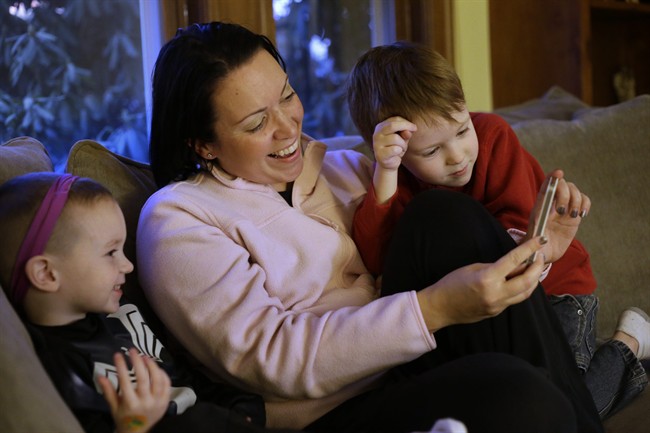While they may struggle with stigma, children of same-sex parents have above average health and well-being, a new study suggests.

Compared to their counterparts from traditional families, kids from same-sex homes score about six per cent higher when it comes to measuring health and family cohesion. That’s even the case after controlling for socio-economic factors, such as parents’ education and income, according to Australian researchers.
The study comes out of the University of Melbourne, where its lead authors say they conducted the largest study of its kind in the world. Their findings are based on about 315 same sex parents in Australia – and their 500 kids. About 80 per cent of the families had female parents and 18 per cent had male parents.
READ MORE: How a father’s diet, lifestyle affect his baby’s healthy development
Kids’ temperament, including mood, mental health, emotions and self-esteem, were gathered by parents who were surveyed. The scientists, led by Dr. Simon Crouch, suggest that kids with same-sex parents were faring better with temperament and the families tend to be closer knit.
“We know that same-sex attracted parents are more likely to share child care and work responsibilities more equitably than heterosexual parent families, based more on skills rather than gender roles. This appears to be contributing to a more harmonious household and having a positive impact on child’s health,” Crouch said in a university statement.

Get weekly health news
“It appears same-sex parent families get along well and this has a positive impact on health,” he explained.
READ MORE: How fatherhood changes a man’s brain
But an unfortunate finding was that two-thirds of these kids deal with some form of stigma – and it seeps into their mental health and emotional happiness.
It could be subtle nuances, such as a letters from the school address to Mr. and Mrs. Or it could be overt, such as bullying at recess, the researchers said.
But the research is only a piece of the puzzle in growing evidence that’s turning the tide.
READ MORE: How motherhood changes a woman’s brain
“It’s often suggested that children with same-sex parents have poorer outcomes because they’re missing a parent of a particular sex. But research my colleagues and I published in the journal BMC Public Health shows this isn’t the case,” Crouch explained on the Conversation.
A May 2014 study, for example, looked at homosexual dads who were primary caregivers next to heterosexual parents. The research found that the daddy primary caregivers were able to active both “parenting” regions of the brain that’s typically divided according to woman or man.
The moms in the study had amygdala activity – the hotspot for memories and emotions like worrying – that was five times stronger than heterosexual dads who took the passenger seat in parenting. Dads, on the other hand, had activity in their superior temporal sulcus – the part of the brain used to read faces and piece together speech.
Homosexual dads had both sides of the brain light up.
Crouch called his findings “liberating” – when same sex parents break the mould instead of conforming to gender stereotypes, ultimately their kids reap the benefits, he suggests.
READ MORE: Want your daughter to break barriers? Dads should do more chores, study suggests
His findings also back up Canadian research that suggested that dads – heterosexual or gay – should do more chores at home if they wanted their daughters to aspire to be a scientist, doctor, engineer or other roles typically dominated by men.
carmen.chai@globalnews.ca
Follow @Carmen_Chai


Comments